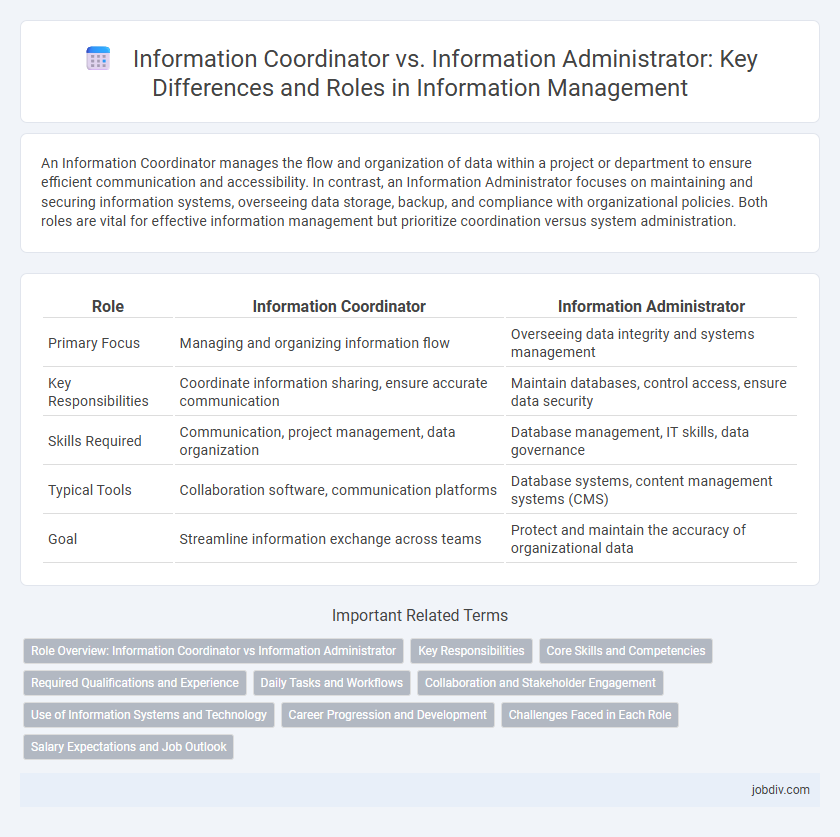An Information Coordinator manages the flow and organization of data within a project or department to ensure efficient communication and accessibility. In contrast, an Information Administrator focuses on maintaining and securing information systems, overseeing data storage, backup, and compliance with organizational policies. Both roles are vital for effective information management but prioritize coordination versus system administration.
Table of Comparison
| Role | Information Coordinator | Information Administrator |
|---|---|---|
| Primary Focus | Managing and organizing information flow | Overseeing data integrity and systems management |
| Key Responsibilities | Coordinate information sharing, ensure accurate communication | Maintain databases, control access, ensure data security |
| Skills Required | Communication, project management, data organization | Database management, IT skills, data governance |
| Typical Tools | Collaboration software, communication platforms | Database systems, content management systems (CMS) |
| Goal | Streamline information exchange across teams | Protect and maintain the accuracy of organizational data |
Role Overview: Information Coordinator vs Information Administrator
An Information Coordinator manages the flow and organization of data within projects, ensuring accurate collection, dissemination, and compliance with information policies. An Information Administrator oversees the overall information systems, maintaining data integrity, security protocols, and system updates across departments. The coordinator focuses on data coordination and communication, while the administrator emphasizes system management and governance.
Key Responsibilities
Information Coordinators manage the collection, organization, and dissemination of data to ensure accurate and timely communication within an organization. Information Administrators oversee data integrity, security protocols, and system maintenance to support efficient information storage and retrieval. Both roles require collaboration with IT teams to optimize information flow and compliance with data management policies.
Core Skills and Competencies
An Information Coordinator excels in managing data flow, overseeing information distribution, and ensuring effective communication across departments, leveraging strong organizational and interpersonal skills. In contrast, an Information Administrator specializes in data accuracy, maintaining information systems, and implementing data governance policies, requiring expertise in database management and attention to detail. Both roles demand proficiency in information technology tools, data analysis, and regulatory compliance but differ in focus between coordination and system administration.
Required Qualifications and Experience
Information Coordinators typically require a bachelor's degree in information management or a related field, along with 2-4 years of experience in data organization and communication processes. Information Administrators often need advanced knowledge in database management, a bachelor's or master's degree in information systems, and 3-5 years of experience managing information workflows and security protocols. Both roles demand strong analytical skills, proficiency with information systems, and familiarity with data governance standards.
Daily Tasks and Workflows
Information Coordinators manage data collection and dissemination, ensuring accurate communication across departments and maintaining information flow integrity. Information Administrators oversee database management, data entry accuracy, and system maintenance to support organizational data infrastructure. Daily tasks of Coordinators emphasize coordination and communication, while Administrators focus on technical data organization and system optimization.
Collaboration and Stakeholder Engagement
Information Coordinators excel in facilitating collaboration by bridging communication between departments and stakeholders to ensure seamless data flow and project alignment. Information Administrators focus on managing and maintaining information systems, enabling stakeholders to access accurate and timely data for decision-making. Both roles require strong stakeholder engagement skills to support organizational goals through effective information management and coordination.
Use of Information Systems and Technology
Information Coordinators focus on managing and organizing data flow within information systems, ensuring effective use of technology for communication and data accessibility. Information Administrators maintain and optimize information systems infrastructure, overseeing security protocols, system updates, and database management. Both roles require proficiency in IT tools, but Coordinators emphasize data coordination while Administrators prioritize system integrity and performance.
Career Progression and Development
Information Coordinators typically focus on organizing and managing data flow within departments, serving as entry-level roles that build foundational skills in information systems and communication protocols. Information Administrators advance to overseeing comprehensive data management strategies, integrating advanced IT solutions, and playing key roles in policy development and compliance, marking significant career progression. Professional development often includes certifications in data governance, project management, and specialized software, enabling a transition from operational tasks to strategic information leadership.
Challenges Faced in Each Role
Information Coordinators often face challenges related to managing the accuracy and timeliness of data distribution across multiple departments, requiring strong communication and organizational skills. Information Administrators typically struggle with maintaining data security, ensuring compliance with regulatory standards, and managing extensive databases efficiently. Both roles demand proficiency in information technology systems but differ in the scope of responsibility, with coordinators focusing on data flow and administrators on data governance.
Salary Expectations and Job Outlook
Information Coordinators typically earn between $45,000 and $65,000 annually, reflecting their role in managing and organizing data flow within organizations, while Information Administrators command a higher salary range of $60,000 to $90,000 due to their responsibility for system oversight and strategic information management. The job outlook for Information Coordinators shows moderate growth of about 6% over the next decade, driven by increasing data reliance in businesses, whereas Information Administrators are projected to experience a stronger growth rate around 9%, fueled by the expanding need for advanced information governance and cybersecurity expertise. Both roles require strong organizational and technical skills, but Information Administrators often demand more specialized qualifications, impacting salary and career advancement opportunities.
Information Coordinator vs Information Administrator Infographic

 jobdiv.com
jobdiv.com